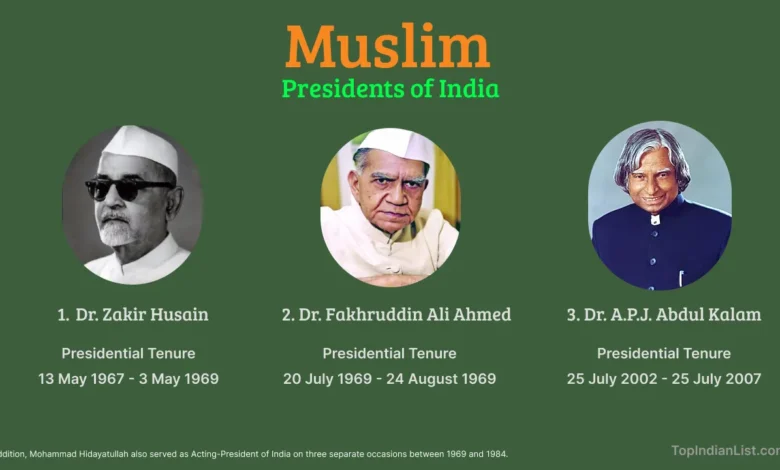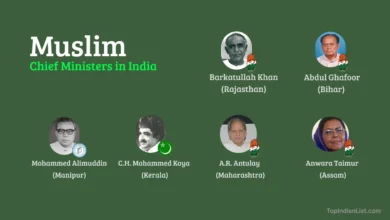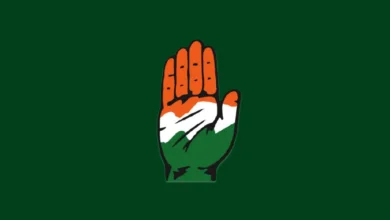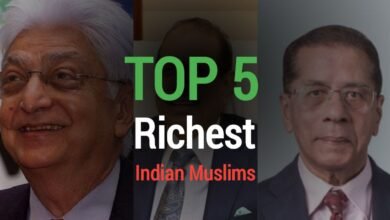List of all Muslim Presidents of India

India has had 15 Presidents since it became a republic in 1950, out of which 3 have been from the Muslim community – Dr. Zakir Hussain,Dr. Fakhruddin Ali Ahmed, and Dr. A.P.J. Abdul Kalam. In addition, Mohammad Hidayatullah, who was Muslim, served as acting President of India on three separate occasions between 1969 and 1984.
Muslims comprise around 14% of India’s population as per the 2011 census. Although only 3 Muslim Presidents have held India’s highest office for a combined total of 13 years. Fakhruddin Ali Ahmed served as President from 1974-1977, Zakir Hussain from 1967 until his death in 1969, and A.P.J. Abdul Kalam from 2002-2007.
The Presidency represents the Head of State in India’s parliamentary system. This article objectively summarizes the background of India’s 3 Muslim presidents, their tenure, political affliation and key details about their lives.
Muslim Presidents of India:
1. Dr. Zakir Husain
- Born: 8 February 1997
- Died: 3 May 1969(72 Years)
- Presidential Tenure: 13 May 1967 – 3 May 1969
- Political Affiliation: Independent
- Awards: Padma Vibhushan(1954), Bharat Ratna(1963)
Dr. Zakir Husain was the first Muslim President of India. An educator by profession, Dr. Husain was a founding member of Jamia Millia Islamia University and served as its Vice Chancellor from 1926 to 1948. He went on to become Vice Chancellor of Aligarh Muslim University in 1948. In recognition of his distinguished service to the field of education, he was awarded the Padma Vibhushan in 1954.
Dr. Husain entered politics in the 1950s. He served as Governor of Bihar from 1957 to 1962 and was elected Vice President of India in 1962. The following year, he received the prestigious Bharat Ratna award. On 13 May 1967, Dr. Zakir Husain was elected 3rd President of India. Unfortunately, he passed away in office in 1969, becoming the first President to pass away during his presidential term.
– Mohammad Hidaytullah(Acting President)
- Born: 8 February 1997
- Died: 3 May 1969(72 Years)
- Acting-Presidential Tenure: 20 July 1969 – 24 August 1969, 6 October 1982 – 31 October 1982, 25 July 1984- 25 July 1984
- Political Affliation: Independent
Mohammad Hidayatullah was the 11th Chief Justice of India, serving from 1968 to 1970. He also served as the 6th Vice President of India from 1979 to 1984. Notably, Hidayatullah acted as President of India on three brief occasions – in 1969 after the death of President Zakir Hussain, in 1982 when President Zail Singh was abroad for medical treatment, and in 1984 as Vice President when President Zail Singh resigned.
Although his presidential tenures were brief. He was highly respected as a legal scholar, author and linguist. Hidayatullah’s distinguished career as Chief Justice, Vice President and temporary President demonstrated his capabilities as an eminent jurist and administrator.
2. Dr. Fakhruddin Ali Ahmed
- Born: 17 December 1905
- Died: 18 September 1992(Age 86 Years)
- Presidential Tenure: 20 July 1969 – 24 August 1969
- Political Affiliation: Indian National Congress
- Awards: Bangladesh Liberation War Honour
Dr. Fakhruddin Ali Ahmed became the second Muslim President of India when he took office in 1974. After independence, Dr. Ahmed held several key political positions. He was elected to the Rajya Sabha in 1952 and the Lok Sabha in 1967.
During his distinguished political career, he served as cabinet minister holding important portfolios like Food and Agriculture, Education, Industrial Development, and Finance. His experience in governance and loyalty to the Congress party led to his election as President of India in 1974. Dr. Ahmed’s presidency, however, was cut short when he passed away in 1977 while still in office.
Controveries:
President Fakhruddin Ali Ahmed’s legacy remains complicated due to some controversial decisions during his term. In 1975, he declared a state of national emergency at Prime Minister Indira Gandhi’s advice. This granted her extraordinary powers to rule by decree without checks. Civil liberties were severely curtailed, media censored and opposition leaders imprisoned. Ahmed approved various questionable orders and constitutional amendments during this 21-month period, leading to accusations that he supported an undemocratic regime. Though Ahmed defended the emergency publicly as necessary for stability, his reputation suffered substantially.
Additionally, some criticized Dr. Ahmed for allowing many Muslim refugees into India from Bangladesh after the 1971 war. The allegations claimed he aided their resettlement to bolster Congress Party’s vote bank.
3. Dr. A.P.J. Abdul Kalam
- Born: 15 October 1931
- Died: 27 July 2015(Age 83 Years)
- Presidential Tenure: 25 July 2002 – 25 July 2007
- Political Affiliation: Independent
- Awards: Padma Bhusan (1981),Padma Vibhushan(1990), Bharat Ratna(1999)
Avul Pakir Jainulabdeen Abdul Kalam, commonly known as A.P.J. Abdul Kalam, was the 11th President of India from 2002 to 2007. He was born in 1931 in Rameswaram, Tamil Nadu and studied physics and aerospace engineering. As a scientist, Kalam spent over four decades working primarily at the Defence Research and Development Organisation (DRDO) and the Indian Space Research Organisation (ISRO). He was instrumental in India’s civilian space program and military missile development, earning him the nickname ‘Missile Man of India.‘ Kalam also played a key technical and political role in the Pokhran-II nuclear tests conducted by India in 1998.
In 2002, Kalam was elected President with support from the ruling Bharatiya Janata Party and the opposition Indian National Congress. As President, Kalam earned widespread respect and was admired for his humility, values and advocacy for technology and youth development. After his term, he returned to a life of education, writing, and public service until his death in 2015 at age 83. Kalam left a lasting legacy as a scientist and as a greatly respected President.



